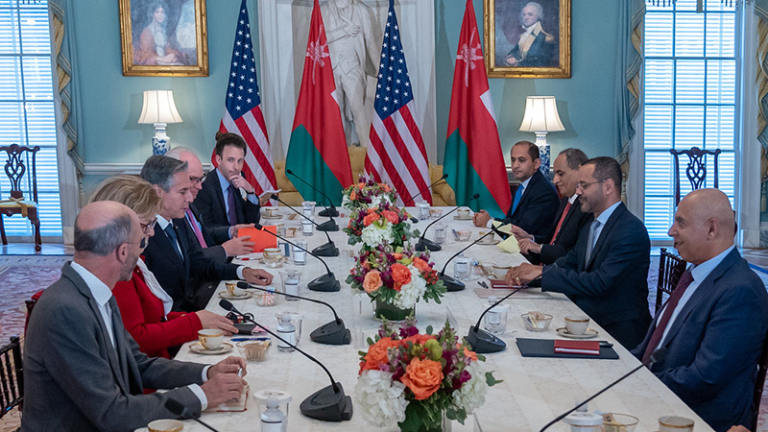
The Sultanate of Oman traditionally has maintained a low profile on the international stage while conducting a friends-of-all foreign policy based on moderation, diplomacy, and dialogue. A geopolitical balancer known for “active neutrality,” Oman avoids aligning with any power bloc against another, even as Muscat depends on Washington as a major arms supplier and as its ultimate security guarantor. As such, Omani officials have tended to avoid publicly criticizing the United States when significant policy disagreements arise.
In recent months, though, the Omani public’s strong support for the Palestinian cause and related political, religious, and social dynamics in the country have led Muscat to vocally condemn the United States for its ironclad backing of Israel’s war on Gaza. Despite the rising anti-American sentiment and the Omani leadership’s discomfort with Washington’s Israel stance, Oman has no intention of abandoning its strategic ties with the United States. The Sultanate will continue to work closely with the Biden administration—which highly values Muscat’s role as an interlocutor with regional US adversaries—to prevent the Gaza conflict’s spread. Oman and its fellow Gulf Cooperation Council (GCC) members are very concerned that developments such as the Iran-allied Yemeni Houthis’ escalatory moves against Israeli-linked commercial vessels in the Red Sea, Israel’s repeated bombings of airports in Syria, and most recently, Israel’s January 2 assassination of senior Hamas officials in Beirut could trigger a broader conflagration. They fear that the war’s expansion could upset the Saudi and Emirati détente with Iran and reignite large-scale violence in Yemen.
Until there is a ceasefire in Gaza, Oman is expected to maintain low-profile cooperation with Washington.
At the same time, Oman (like the other GCC states, save Bahrain) has declined to participate officially in Operation Prosperity Guardian, the new US-led security initiative to counter the Houthis in the Red Sea. Oman likely does not want to antagonize Iran or to provoke a backlash at home by being seen to side with the United States against the Palestinians. Until there is a ceasefire in Gaza, Oman is expected to maintain low-profile cooperation with Washington while at times speaking out against US policy and permitting its citizens some leeway to oppose Israel.
Oman and the Question of Palestine
Oman is part of the ‘Arab consensus’ regarding the Israel-Palestine conflict. It has steadily favored a two-state solution based on international law, refusing to normalize relations with Israel until it agrees to the terms of the 2002 Arab Peace Initiative that proposed an independent Palestinian state within the pre-1967 borders. Muscat has long supported the right of the Palestinians to self-determination, statehood, and dignity. Omani officials stress that finding a just and lasting solution to the question of Palestine is important to long-term stability in the Middle East. Oman has maintained informal ties with Israel for decades, much longer than other GCC members. In contrast to some Gulf states, Oman did not pressure Egypt against making peace with Israel in 1979, or Jordan in 1994.
During Sultan Qaboos bin Said Al Said’s reign (1970-2020), Muscat’s positions reflected a genuine belief that peace between the Israelis and Palestinians and other Arabs was attainable through diplomacy and dialogue. At the time of the 1991 Madrid Conference and the 1993 Oslo Accords, Oman was optimistic that the Israeli-Palestinian conflict could be resolved under US mediation. Out of the Oslo Accords came the Oman-based Middle East Desalination Research Center (MEDRC), which was seen as a model for Arab-Israeli capacity-building and shared research to advance multi-track diplomacy between Tel Aviv and Arab capitals. (MEDRC still exists as the last surviving Oslo Accords organization.) Following Oslo, Israel and Oman opened commercial offices in each other’s countries, until Omani authorities closed them in 2000 in response to Israeli violence against Palestinians during the second Intifada. Since the 1990s, top Omani and Israeli officials have met in Israel, Qatar, Poland, and the United States, and Muscat has hosted three Israeli Prime Ministers—Yitzhak Rabin, Shimon Peres, and Benjamin Netanyahu—in Muscat.
While engaging with Israel at times, Oman has managed to avoid problems with Iran-aligned actors in the region.
While engaging with Israel at times, Oman has managed to avoid problems with Iran-aligned actors in the region. As the most Iran-friendly GCC member, Oman never joined the anti-Islamic Republic ‘consensus’ among Gulf Arab states or perceived any threat from Hezbollah or other Iran-backed Shia groups. Oman also was the only GCC state not to sever or downgrade diplomatic relations with the Iran-allied government in Damascus during the Syrian civil war.
By the same token, while Oman has never provided material support to Hamas, the Sultanate has not designated Hamas a terrorist organization. Notably, Oman is one of the few Arab countries to have hosted Hamas political leader Ismail Haniyeh, who attended Sultan Qaboos’s January 2020 funeral and met with his successor Sultan Haitham bin Tariq Al Said, praising Qaboos’s leadership and defense of the Palestinian struggle to achieve statehood.
A Change in the Post-Qaboos Era
There has been a shift in Omani foreign policy toward Israel since Sultan Haitham took the helm. After Netanyahu’s far-right government came to power in 2022, Oman’s leadership has no longer viewed its engagement with Israel as potentially reaping benefits for the region.
Although Oman agreed last February to allow Israeli flights to enter its airspace (after Saudi Arabia took this step in July 2022), Omani officials did not signal that the move was a step toward joining the Abraham Accords that normalized relations between Israel and Bahrain, the United Arab Emirates, and Morocco. Indeed, two months earlier, the Majlis al-Shura, Oman’s elected legislative body, had voted to ban Omanis from interacting with Israelis in person and on the internet and from contact in the domains of economics, culture, and sports.
Muscat’s stance against Israel has become noticeably firmer, as evinced by Omani officials’ uncharacteristically vocal criticism.
Since Israel’s October invasion of Gaza, Muscat’s stance against Israel has become noticeably firmer, as evinced by Omani officials’ uncharacteristically vocal criticism on Middle East issues. On December 8, Foreign Minister Sayyid Badr Al-Busaidi went to X (formerly Twitter) to condemn the United States for vetoing a draft UN Security Council resolution that called for an immediate ceasefire in Gaza. In the words of Muscat’s chief diplomat, Washington’s veto was “a shameful insult to humanitarian norms” that highlighted the United States’s willingness to “sacrifice the lives of innocent civilians for the cause of Zionism.”
It is also significant that Oman has not officially condemned Hamas’s actions on October 7 or labeled them as an act of terrorism. Oman’s Permanent Representative to the Arab League Abdullah Al-Rahbi described Hamas’s attack as an act of resistance to Israel’s decades of occupation, while Al-Busaidi stressed that the Palestinians have a right to resist Israel and that the Israeli campaign of displacing Gazans is “a precursor to genocide.”
Public Opinion in Oman
As in the Arab-Islamic world and Global South, the widely shared view in Oman is that the United States and other western countries hold a double standard on human rights and the “rules-based international order.” Anger over Western support for Israel’s war on Gaza is widespread in Oman and is being expressed in ways that are unusual if not unprecedented for the Sultanate. For example, an October 16 video posted on X showed an Omani citizen approaching a group of British military officers in the coastal city of Duqm and demanding that they leave the country because of the United Kingdom’s support for Israel.
Omanis are also using their economic power to show solidarity with the Palestinians. During a recent visit to Oman, this writer learned that many Omanis are boycotting US companies perceived as pro-Israel, such as Starbucks and McDonalds, as well as Israeli products that had entered Oman via Dubai’s Jebel Ali Port. While not officially endorsing such boycotts, Oman’s government has said that it respects the right of individual citizens to not buy specific products linked to international political causes.
Omani public opinion agrees that Hamas engages in acts of legitimate resistance.
Omani public opinion agrees that Hamas engages in acts of legitimate resistance, not terrorism. Many Omanis believe that Hamas’s Operation al-Aqsa Flood was a predictable outcome of Israel’s policies that have deprived Palestinians of their basic rights, freedom, and dignity for decades. The view in Oman is that the solution to violence waged by Hamas is to address root causes of the Israeli-Palestinian conflict and to resolve it based on a two-state solution, and that without Israel taking such steps, peace will remain elusive.
Omani citizens have been participating in protests against the war in Gaza, including some in support of Hamas. Notably, a Palestine solidarity rally took place outside the US Embassy in Muscat 11 days after October 7, prompting a US warning that American citizens and visa applicants should stay away from the area near the diplomatic mission that day, and a US advisory for Americans to “exercise caution and avoid large gatherings.”
With public opinion remaining firmly on the side of Palestine, Omani officials will remain under pressure to publicly convey their disapproval of Washington’s foreign policy vis-à-vis Israel-Palestine. This is likely to help isolate the United States on the international stage. As the Biden administration’s Middle East policy leaves many Arab states increasingly unsettled about their dependence on Washington, Oman and other regional actors may subsequently seek to pursue deeper ties with China, Iran, and Russia.
As the Gaza war rages on, Oman will aim to shield itself from the conflict’s fallout while working with global and regional players to contain and ultimately to stop the fighting. The United States will remain a key such player, but its partnership with Oman could become more politically sensitive for the Sultanate, especially if the carnage and humanitarian catastrophe in Gaza continue to worsen.
The views expressed in this publication are the author’s own and do not necessarily reflect the position of Arab Center Washington DC, its staff, or its Board of Directors.
Featured image credit: US DoS

